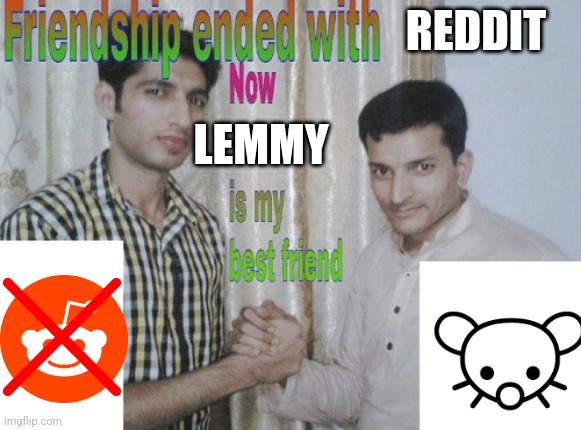Any explanation / meaning / backstory is more than welcome, or you can just drop it for everyone to try and resolve.
Overmorrow.
I hate saying the day after tomorrow like some peasant.
We already have that in German! Morgen and Übermorgen (Über- = over-)
The even better morgen, the übermorgen ^^
Y’all should bring it back to common use and rejoin the civilized world by overmorrow evening.
I feel we should simplify that even further by saying undermorrow.
deleted by creator
No, the underneath of the day after tomorrow (night), as opposed to the above (morning, or day).
It is an official word, but nobody uses it anymore in English. Same goes for ereyesterday (the day before yesterday)
Well, we can fix that.
Nibling. Like sibling but for nephews and nieces. Helpful when describing them as a group, or unspecified, and also good if one ends up being somewhere less clear on the gender binary.
Something about that word irks me and I’m not sure why.
To close to nibble?
But siblings and nieces/nephews are generationally distinct. “-ibling” evokes to me a generational parallel. I would sooner accept it as a synonym for cousin. I don’t disagree with the utility of such a word, but I don’t care for that word used for this purpose.
Perhaps I don’t think about cousins enough to have considered that. To me “sibling” refers to my brothers and sisters, and therefore extends naturally to “their kids” more than to other family members on the same generation. The old English word that sibling was revived from meant “kinfolk” and would have included all family whether brothers, nieces, cousins or aunts.
If I talk about “my nildren” it’s maybe a bit too possessive, and “nids” Is gross, but I’d be open to other suggestions! Niblings is defintely kinda silly, which was part of the charm when they little anklebiters.
Gramercy, in lieu of “thank you very much.” I don’t know why, but it’s something from Mallory’s King Arthur stories that always stuck with me and I think it deserves a revival.
ETA: for those unaware, it’s a conjunction of the French gran merci, which translates the same way you probably suspect: big thanks, or grand thanks, or in other words, thank you very much
Funnily enough we don’t even use “gran(d) merci”, at least not anymore, we use merci beaucoup instead, because we french are incapable of speaking concisely
Je suis American and only just learning some French, I’m glad you came along with better notes. Gramercy, in fact!
Pas de problème!
Thank you very much for not creating some omegamercy or chadmercy… or should i rephrase: gramercy for that!
Irregardless - (adj.) an attempted rebuke or rebuttal of a statement that ignores or overlooks already stated facts, which if included in the thought was have already rendered it moot.
Irregardless - (interj.) a response to declare someone’s statement irregardless.
Zhir. It’s a word that exists but I want it to be more popularized and normalized for the sake of non-binary folk having something other than They/Them. This is both because i feel that NB persons need more representation, and as a matter of selfishness. I want more options when writing non-gendered folk (Ever try writing a book of mostly non-gendered robots? I did. I’m just glad the English language doesn’t assume gendering like french or spanish.)
Personally, I like they/them better. It’s already been used for persons of unknown gender for a long time, and using it as explicitly non gendered is really seamless.
Wheras neopronouns can feel very attention calling and othering. Then there’s the issue that most of them sound gendered anyway, (‘zhir’ sounds a lot more like ‘her’ than ‘him’)
I do agree about the need for more nb representation, though.
You raise a fair point in it being an attention grabber. I took the prompt as ‘what could you introduce in day to day normal usage to the point it is ‘normal’ useage rather than seen as exceptional.’
For pretty much the reason you stated. So that it isn’t attention grabbing and NB persons aren’t going ‘LOOK AT MEEE! SEE! I AM DIFFERENT!’
Though you also bring a point that it still sounds quasi gendered. I’ll differ to someone who’s actually NB on the matter since … well yea.
Wankhammer
I think you know why.
I do not. But I’m not sure I do actually want to.
(to be) polygoned- meaning to have your phone go off with an amber alert or an emergency alert. (The act of setting off the phones is called polygonning). Very niche to what I do, but I use it all the time.
Dingus.
It’s such a good soft insult, like doofus
yeah, it sounds fun, but knob always steals the show for me — It just works too damn well…
Consistify.
ఐ థింక్ వె నీద న్యూ లెత్తెరింగ్ ఇన్స్టెడ్
Surprisingly, it’s not pronounced like it’s spelled.
For the lazy
Spoiler

I’ve consulted this matter with the board and they allowed to use it on this planet, but not on Thursdays. They appreciate the effort of finding the right characters for it.
deleted by creator
Nexter “Take the nexter exit” It’s not this one, it’s the following one. That way we can use next for the next exit (yes this one that’s coming up)
It’s too similar. Can I suggest penext. Like penultimate
Maybe overnext the same as overmorrow? Pennext sounds like some annoying AI scam company.
legiterally
legitimately and literally
Either schway from Batman Beyond or schkinky (however it’s spelt, too lazy to find the episode it’s used in and look at the subtitles) from Ahhhhh! Real Monsters!
Both basically mean the same thing. Only difference is how schminky is used in ARM to describe a person/monster as cool rather than an idea or object.
Schwifty.
It means you take down your pants and your panties, shit on the floor and get schwifty in here.
Bornist. Being prejudiced based on how you were born. An umbrella term for racist, sexist, and whatever else you want to put in there.
Isn’t that just bigotry?
Bigotry is something else entirely. That’s more about ways of thinking













